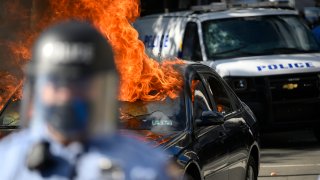
When announcing federal charges against four men accused of torching police cars in Philadelphia during a protest in May, U.S. Attorney William McSwain gave a stark warning: He would use the full force of the federal government against others who cause mayhem.
"If you engage in violent civil unrest and commit a federal crime in this district, we will come after you as hard as we can," McSwain, of the Eastern District of Pennsylvania, said at a news conference Thursday. "You will go to jail."
In addition to the arson offenses, federal prosecutors said a grand jury had charged the men with one count each of "obstructing law enforcement in the commission of their duties during a civil disorder."
The statute, which dates back to 1968 and was enacted during a tumultuous period of civil rights and anti-war protests, has rarely been used following the Nixon administration, legal scholars say. But this year, in the aftermath of nationwide unrest set off by the killing of George Floyd, a Black man in Minneapolis who died after being pinned by a police officer's knee, federal prosecutors have leveled the civil discourse-related charge in at least two dozen cases across the country, a review by NBC News has found.
While Philadelphia is now the latest city where the charge has come up, U.S. attorneys have included them in cases in Houston; in Boston; in Chicago; in Delaware; in South Carolina; in Mobile, Alabama; in Rochester, New York; in Erie, Pennsylvania; and in Portland, Oregon, where there has been no fewer than seven cases of protest-related civil disorder charges.
"It was almost never used until this current administration," said Stephen Kanter, an attorney and dean emeritus at Lewis & Clark Law School in Portland.
Read the full story on NBCNews.com

